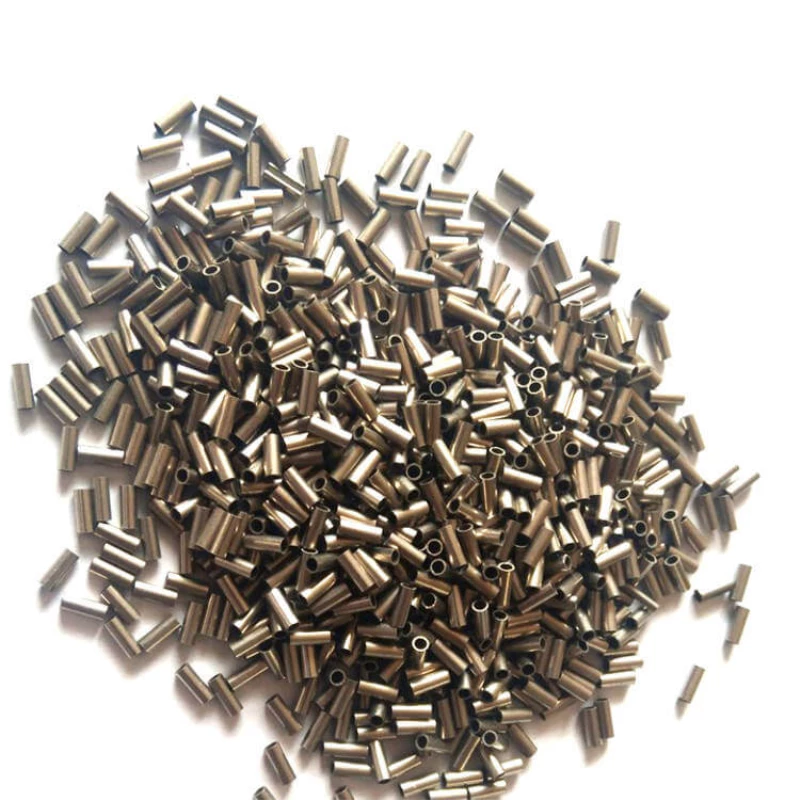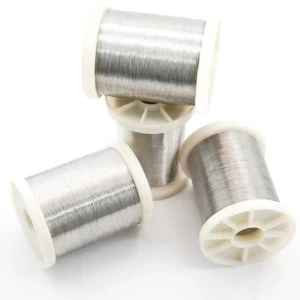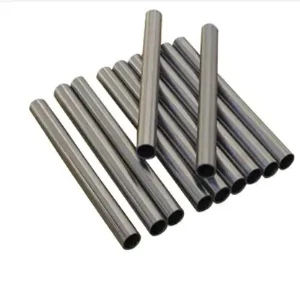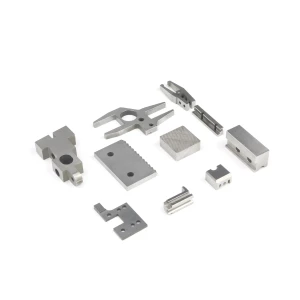Alloy 200/201 is extremely resistance to caustic alkalies up to and including the molten state. The extra-low carbon content of Alloy 200/201 gives virtual immunity to intergranular attack above about 315°C. The presence of chlorates must be kept to aminimum, as they accelerate the rate of attack.
Good resistance to corrosion in acids and alkalis and is most useful under reducing conditions. Outstanding resistance to caustic alkalis up to and including the molten state. In acid, alkaline and neutral salt solutions the material shows good resistance, but in oxidizing salt solutions severe attack will occur. Resistant to all dry gases at room temperature and in dry chlorine and hydrogen chloride may be used in temperatures up to 550C. Resistance to mineral acids varies according to temperature and concentration and whether the solution is aerated or not. Corrosion resistance is better in de-aerated acid.
| Item Name | capillary pure Nickel tube |
| Grade | Ni200, Ni201, N4, N6 |
| Standard | ASTM B161 B163 |
| Dimension(MM) | OD1.0-168 xID0.1-10x 100-15000 MM |
| Grade | Ni+Co | Cu | Si | Mn | C | Mg | S | P | Fe |
| N4 | 99.9 | 0.015 | 0.03 | 0.002 | 0.01 | 0.01 | 0.001 | 0.001 | 0.04 |
| N6 | 99.5 | 0.1 | 0.1 | 0.05 | 0.1 | 0.1 | 0.005 | 0.002 | 0.1 |
| Ni201 | 99 | ≤0.25 | ≤0.35 | ≤0.35 | ≤0.02 | ≤0.01 | ≤0.40 | ||
| Ni200 | 99 | 0.2 | 0.3 | 0.3 | 0.15 | 0.01 | 0.4 |
Nickel Tube is a pipe material made of pure nickel or nickel alloy, which has excellent corrosion resistance, high strength, good plasticity and stable mechanical properties. These characteristics make nickel Tube widely used in many industries such as chemical industry, petroleum, aerospace, food processing and other fields.
First, let’s discuss the classification of nickel tubes. According to different materials, nickel tubes can be divided into pure nickel tubes and nickel alloy tubes. Pure nickel tubes are mainly composed of high-purity nickel elements, while nickel alloy tubes are synthesized with nickel and other metal materials such as chromium, molybdenum, iron, etc. to improve certain specific properties.
Next, let’s learn more about the characteristics of nickel tubes. Nickel tube has excellent corrosion resistance and can resist erosion by a variety of acids, alkalis, salts and organic chemicals. This makes nickel tubes ideal for many chemical reaction processes, especially those requiring a high degree of purity and contamination-free applications. In addition, nickel tubes also have good heat resistance and low-temperature toughness, and can maintain stable performance under extreme temperature conditions.
The production process of nickel tubes is also one of the key factors in their quality. Usually, the process of producing nickel pipes includes smelting, hot rolling, cold drawing, heat treatment and other steps. By precisely controlling the parameters of each link, we can ensure that the dimensional accuracy, surface finish and mechanical properties of the nickel tube meet strict standards.
In practical applications, nickel tubes are used in a wide range of applications. For example, in the chemical industry, nickel pipes are often used to transport highly corrosive chemicals; in the petroleum industry, they are used as high-pressure resistant pipelines in oil wells; in the food processing industry, nickel pipes are used due to their non-toxic and odorless properties. Tubes are widely used for the transportation of food-grade fluids; in the aerospace industry, the high reliability of nickel tubes makes them ideal for critical structural components.
In addition to the above fields, nickel tubes are also widely used in the nuclear industry, pharmaceutical industry, power industry, etc. In these fields, the corrosion resistance, high temperature resistance and high strength of nickel pipes play an important role.
However, it should be noted that although nickel tubes have many advantages, they still need to be carefully selected and used in practical applications. Because different working environments and conditions may require different types and specifications of nickel pipes to ensure optimal performance and safety.
Application:
* Manufacture and handling of sodium hydroxide, particularly at temperature above 300C.
* Production of viscose rayon. Manufacture of soap.
* Analine hydrochloride production and in the chlorination of aliphatic hydrocarbons such as benzene, methane and ethane.
* Manufacture of vinyl chloride monomer.
* Reactors and vessels in which fluorine is generated and reacted with hydrocarbons.
* Processes using caustic alkalines
* Food Processing
* Synthethic Fiber Production
We have more categories for you. lf you can't find the products you want above,just fill in the form and tell us whatproducts you want to import from China.
















